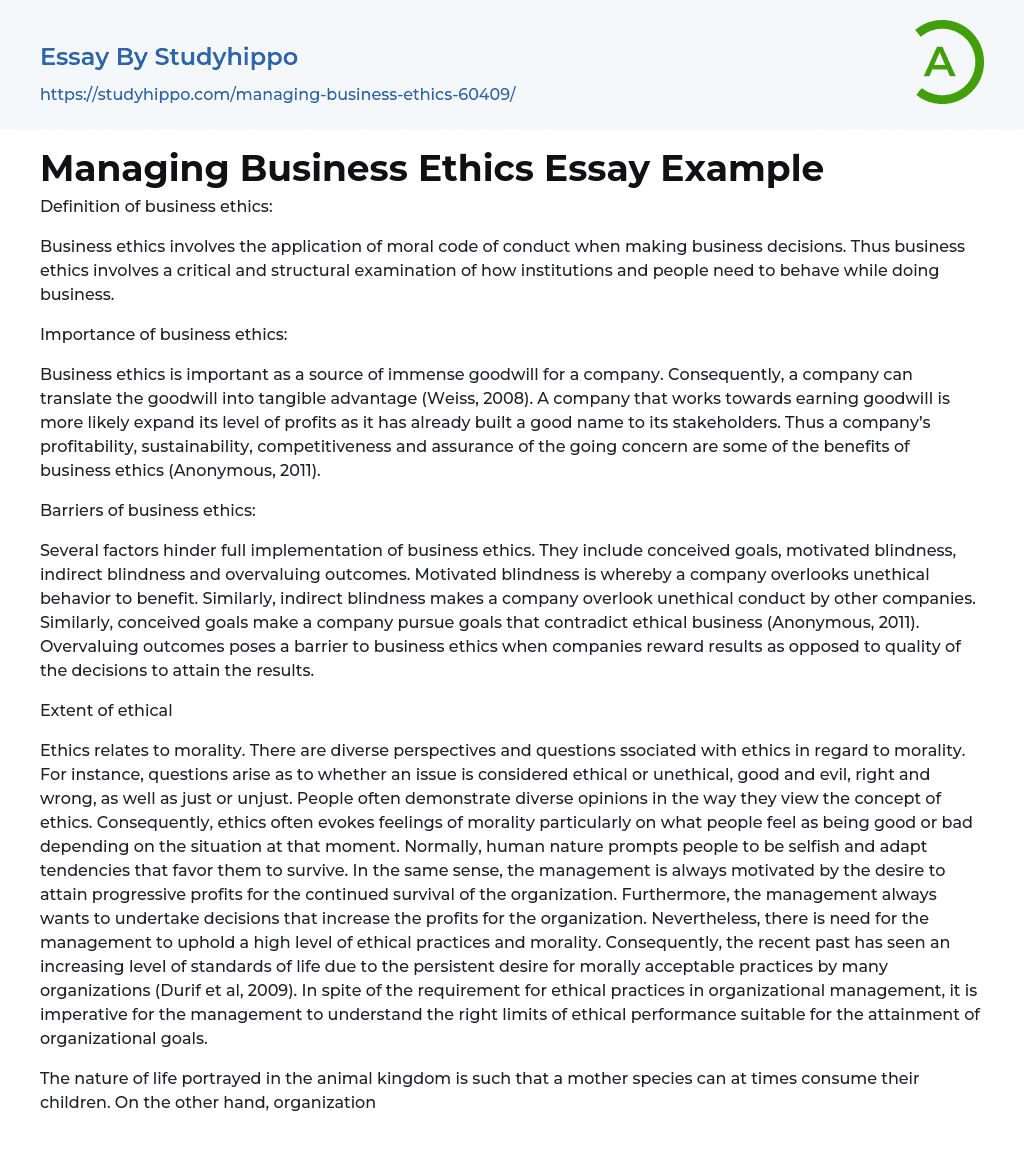Definition of business ethics: Business ethics refers to the application of a moral code of conduct in making business decisions. It involves critically examining how institutions and individuals should behave while conducting business.
Importance of business ethics: Business ethics is crucial in building goodwill for a company. By earning goodwill, a company can gain tangible advantages that can increase profits and establish a positive reputation with stakeholders. Therefore, business ethics directly impacts a company's profitability, sustainability, competitiveness, and assurance of its future.
Barriers of business ethics: There are various factors that hinder the full implementation of business ethics. These barriers include motivated blindness, where a company turns a blind eye to unethical behavior for personal gain. Indirect blindness occurs when a company disregards unethical conduct by other businesses. Conceived goals refer to pursuing obje
...ctives that contradict ethical business practices. Lastly, overvaluing outcomes obstructs business ethics by prioritizing results over the quality of decision-making processes.
Extent of ethical: Ethical behavior is closely correlated with morality.There are diverse perspectives and questions associated with ethics in regard to morality. Questions arise as to whether an issue is considered ethical or unethical, good and evil, right and wrong, as well as just or unjust. People often demonstrate diverse opinions in the way they view the concept of ethics. Consequently, ethics often evokes feelings of morality particularly on what people feel as being good or bad depending on the situation at that moment. Normally, human nature prompts people to be selfish and adapt tendencies that favor them to survive. In the same sense, the management is always motivated by the desire to attain progressive profits for the continued survival of the organization. Furthermore
the management always wants to undertake decisions that increase the profits for the organization. Nevertheless, there is a need for the management to uphold a high level of ethical practices and morality. Consequently, the recent past has seen an increasing level of standards of life due to the persistent desire for morally acceptable practices by many organizations (Durif et al, 2009). In spite of the requirement for ethical practices in organizational management, it is imperative for the management to understand the right limits of ethical performance suitable for the attainment of organizational goals. The nature of life portrayed in the animal kingdom is such that a mother species can at times consume their children.On the other hand, organizations may need to implement certain measures that benefit them by establishing their position in the desired market. Ethical principles serve as the foundation for various concepts in modern organizations. Ethics guide the priorities of all organizations. The management must find a balance between the different pursuits of an organization and the need to uphold morality in its practices. Ethical considerations are significant as they shape corporate priorities in most of the business organization's activities. The pursuit of ethical practices in business has greatly influenced how businesses and organizations decide on their profit-making operations. Ethical business involves making socially responsible decisions instead of solely focusing on profit maximization. In business and management practice, observing ethics is crucial. A manager cannot neglect ethical considerations in order to solely pursue profit maximization. Moreover, the fact that ethical practice is at the forefront of modern business means that all management decisions should be directed towards ethical behavior. Therefore, business decisions related
to profit maximization, employment, production, corporate restructuring, and virtually all decision-making activities need to be grounded in ethical considerations.The management frequently faces the challenge of dealing with the inclination to prioritize personal gain and financial success over ethical concerns.
- Values of Life essays
- Ethical dilemma essays
- Normative Ethics essays
- Virtue Ethics essays
- Belief essays
- Deontology essays
- Moral essays
- Virtue essays
- Work Ethic essays
- Board Of Directors essays
- Brand Management essays
- Business Ethics essays
- Business Management essays
- Change Management essays
- Comparative Analysis essays
- Decision Making essays
- Dispute Resolution essays
- Knowledge Management essays
- Leadership essays
- Leadership and Management essays
- Manager essays
- Operations Management essays
- Performance Management essays
- Product Management essays
- Project Management essays
- Quality Management essays
- Risk essays
- Risk Management essays
- Scientific Management essays
- Stress Management essays
- supply chain management essays
- Time Management essays
- Total Quality Management essays
- Acceptance essays
- Age Of Enlightenment essays
- Child Observation essays
- Confucianism essays
- Conscience essays
- Critical Reflection essays
- Destiny essays
- Determinism essays
- Empiricism essays
- Environmentalism essays
- Epistemology essays
- Ethics essays
- Ethos essays
- Existence essays
- Existentialism essays
- Fate essays
- Free Will essays




